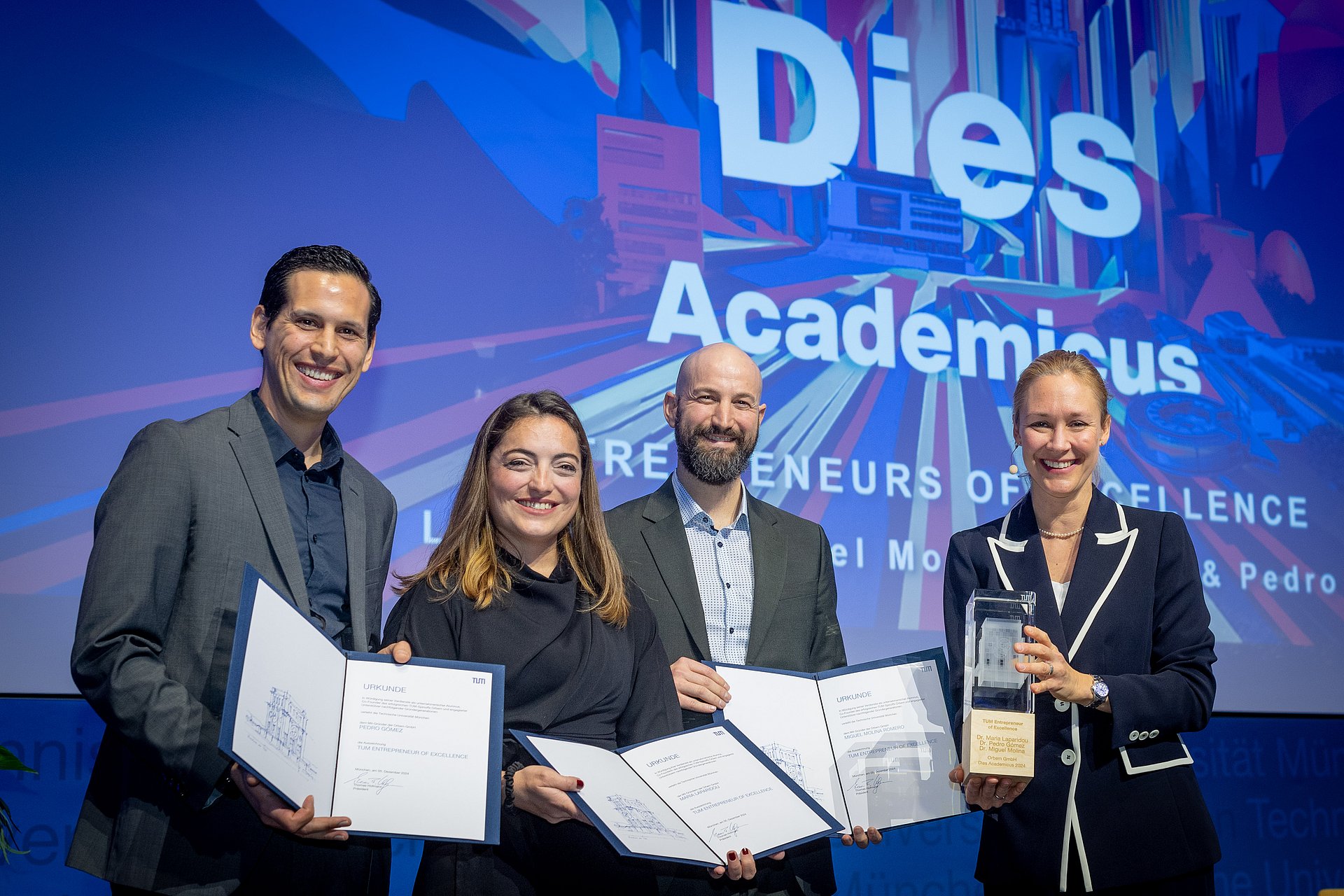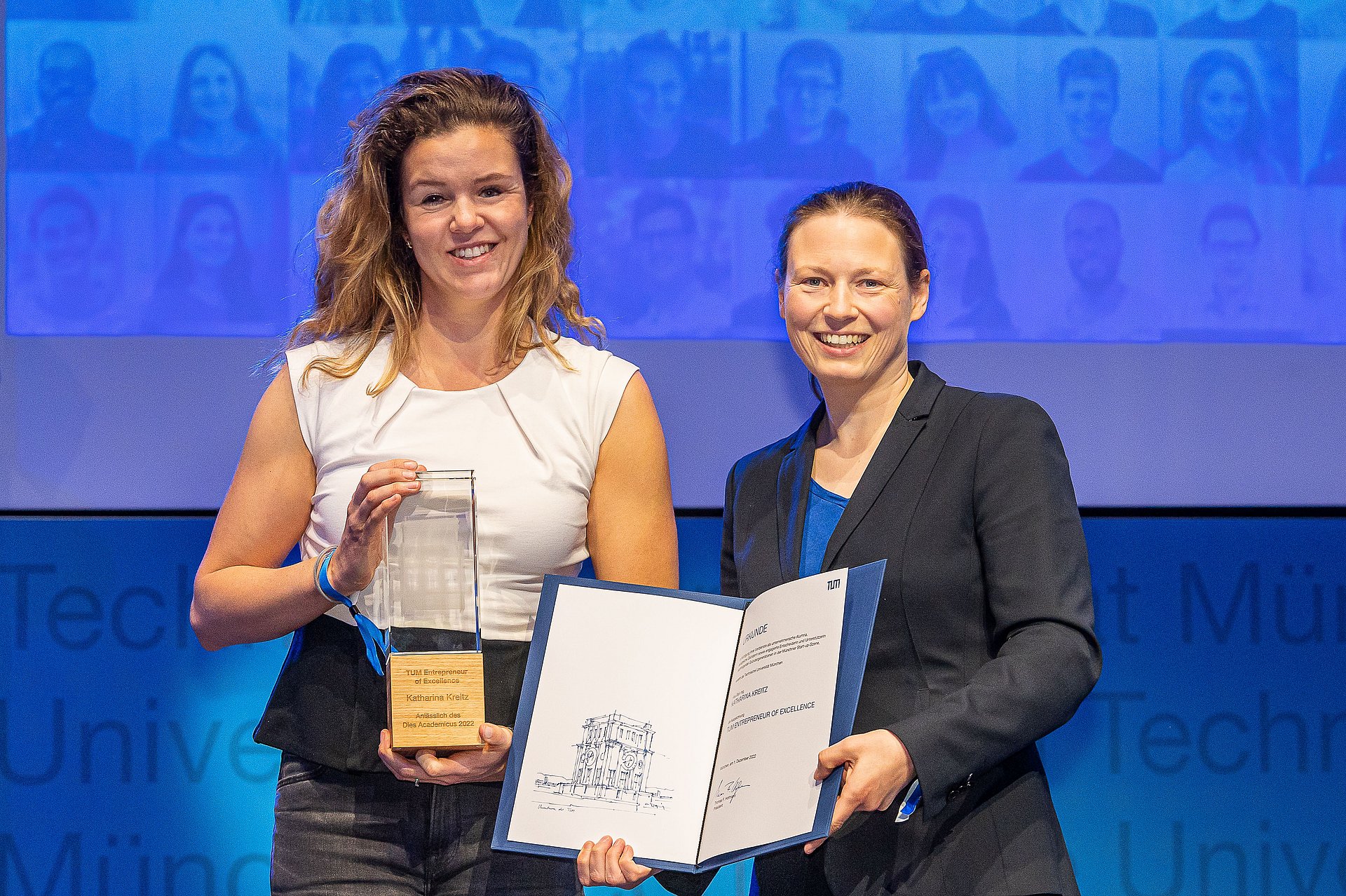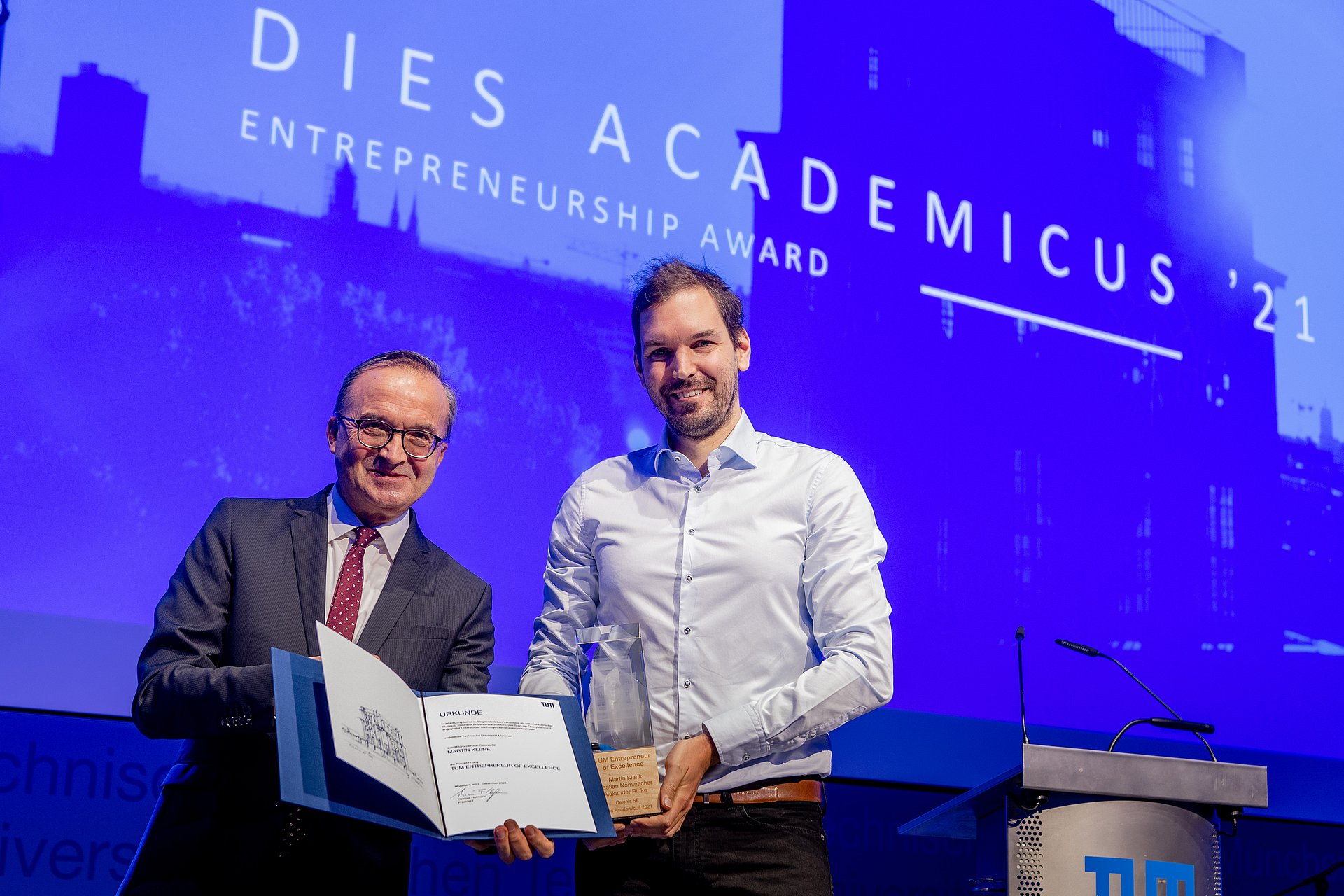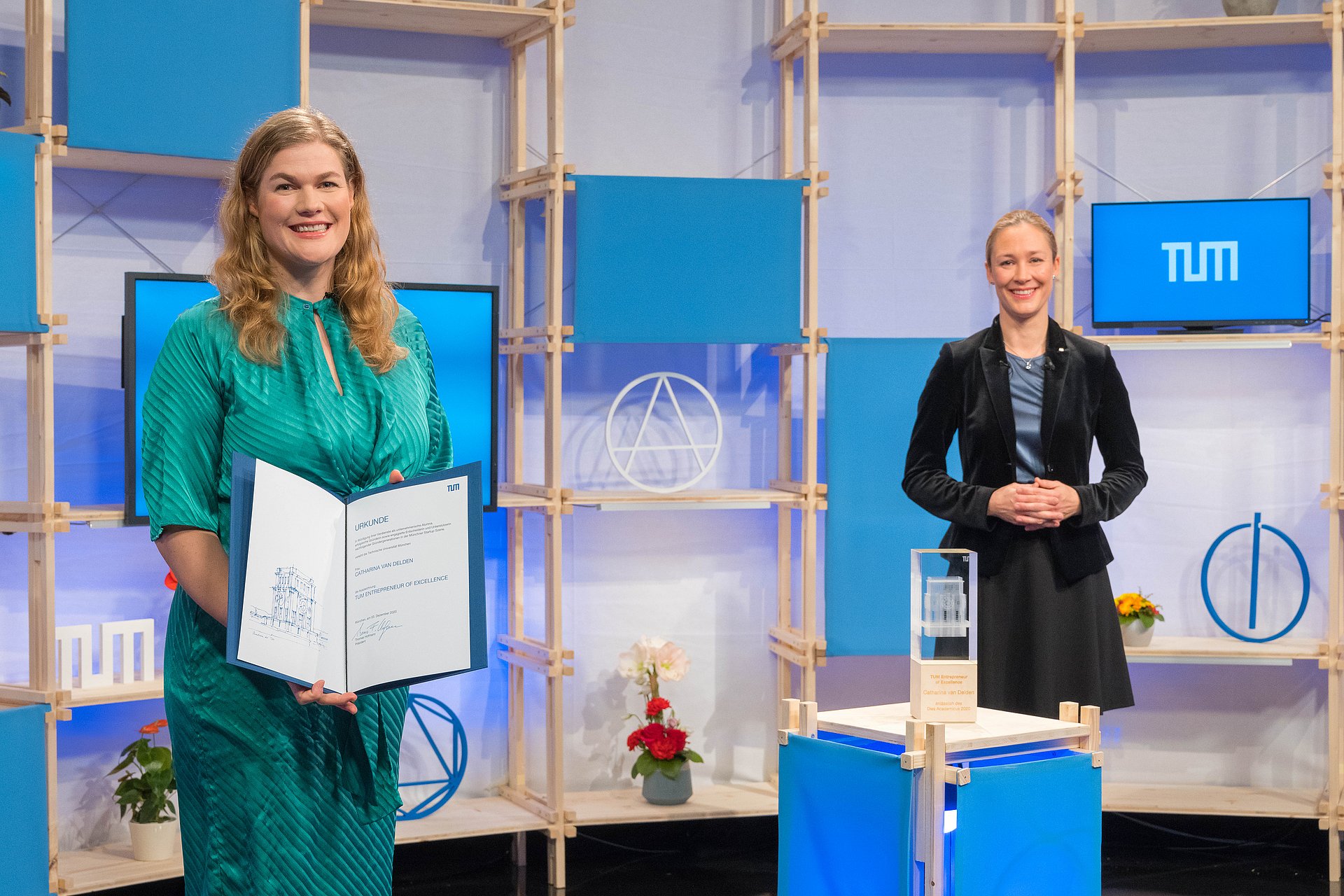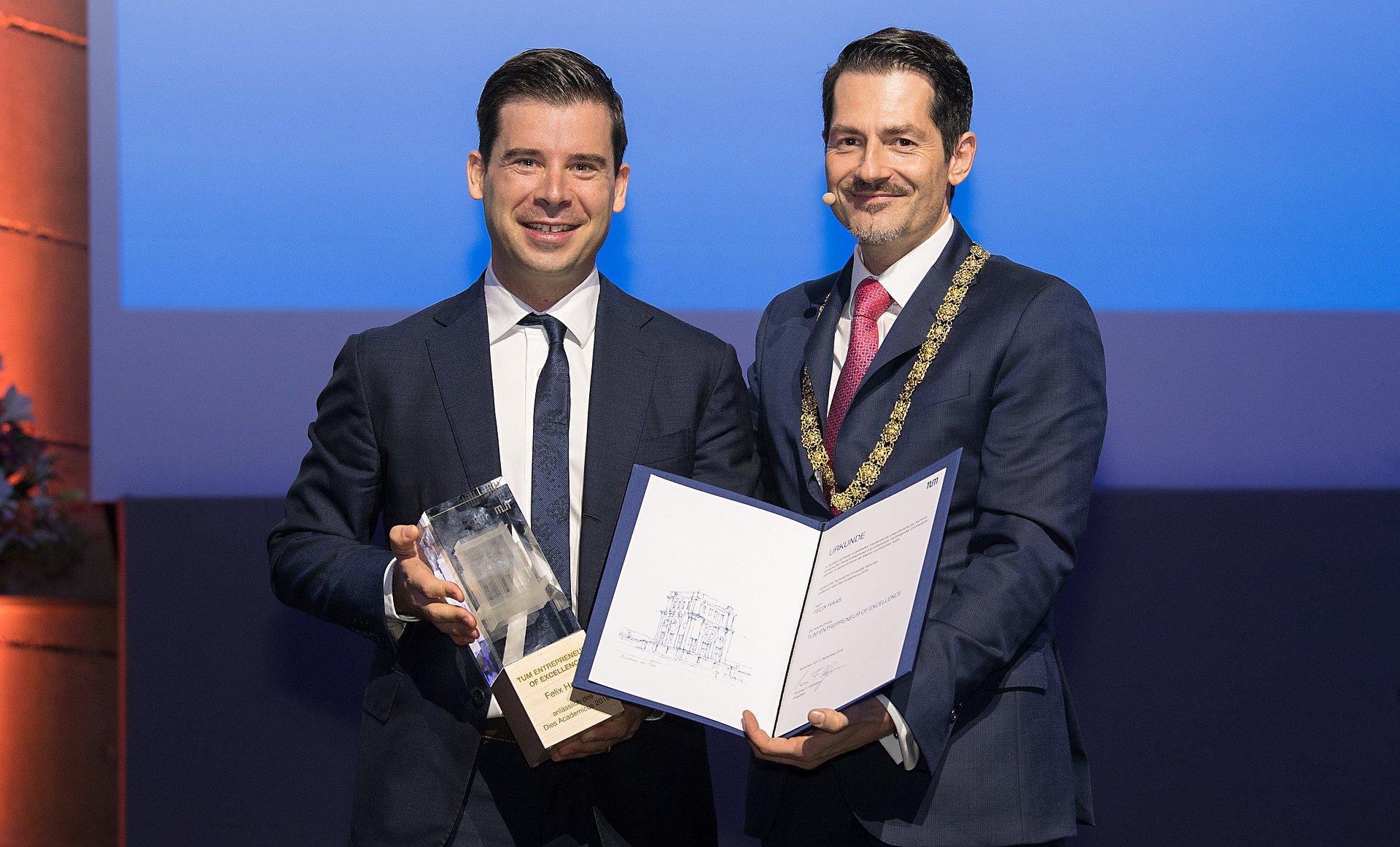TUM Entrepreneurs ofExcellence
As a sign of appreciation of successful founders of the Technical University of Munich, the president Thomas F. Hofmann awards the honorary title Entrepreneur of Excellence to an outstanding founder of the TUM at the Dies Academicus, in order to honour important and committed entrepreneurs with a role model function. With the award of the title, the Entrepreneur of Excellence participates in the founding activities of the university and supports future founder generations with his or her valuable experience.
Entrepreneur of Excellence 2025: Dr. Pedro Gómez, Dr. Maria Laparidou und Dr. Miguel Molina Romero
The Technical University of Munich honors Dr. Pedro Gómez, Dr. Maria Laparidou, and Dr. Miguel Molina Romero, founders of Orbem, as TUM Entrepreneurs of Excellence 2025 for their outstanding entrepreneurial achievements. Founded in 2018, Orbem leverages AI-powered imaging, particularly accelerated magnetic resonance imaging (MRI), to non-destructively scan, classify, and sort food, seeds, and biological samples, driving sustainable innovation.
All three founders are TUM alumni with doctorates, having honed their expertise at the intersection of technology and entrepreneurship. Orbem’s flagship product, “The Genus,” an advanced MRI system, serves the food processing (poultry, nuts) and seed breeding industries. It prevents the waste of approximately 10 billion unfertilized eggs annually, sufficient to feed 28 million people one egg daily for a year, and reduces energy use per viable plant in seed breeding by up to 90%. Supported by TUM Venture Labs and UnternehmerTUM, Orbem is now a global leader in AI-driven inspection technology.
As active contributors to Munich’s startup scene, Gómez, Laparidou, and Molina Romero inspire the TUM community by demonstrating how research can translate into impactful ventures. During their one-year tenure as Entrepreneurs of Excellence, they will enrich TUM’s entrepreneurial initiatives through workshops, guest lectures, or participation in the TUM IDEAward, sharing their expertise to empower the next generation of founders.
The Technical University of Munich honors Daniel Metzler and Josef Fleischmann, founders of Isar Aerospace, as TUM Entrepreneurs of Excellence 2024 for their outstanding entrepreneurial achievements. Their company, founded in 2018, is revolutionizing the New Space industry with tailored microlaunchers for small and medium-sized satellites, enabling cost-efficient access to orbit.
Both TUM alumni—Daniel Metzler with a Master’s in Aerospace (2019) and Josef Fleischmann with a Master’s in Mechanical Engineering (2015)—developed initial prototypes of engine components in TUM’s WARR student research group and MakerSpace. Supported by UnternehmerTUM’s Xpreneurs Incubator and venture capital investments, Isar Aerospace has grown rapidly, now employing over 350 staff in Ottobrunn. Metzler’s advisory role with the European Space Agency (ESA) underscores the company’s innovative impact.
Metzler and Fleischmann remain closely connected to their alma mater, recruiting talent from TUM and inspiring the next generation of entrepreneurs. As Entrepreneur of Excellence, they will actively engage in TUM’s entrepreneurial activities, such as guest lectures, mentoring, or participation in the TUM IDEAward, further strengthening the university’s startup ecosystem. Their pioneering work makes them role models for TUM students and researchers.
Entrepreneurial talent is often already evident during studies, as is the case with this year's TUM Entrepreneur of Excellence, Katharina Kreitz.
Her company vectoflow, founded in 2015, produces innovative customised flow measurement technology for many different applications and is now the global market leader in its segment.
The idea for the company was born during her studies, where the budding engineer worked in industry (e.g. NASA, Airbus, BMW) and at university (TUM Mechanical Engineering, specialising in aeronautics, gas dynamics and astronautics). Dissatisfied with the existing probes and measurement options, Katharina Kreitz and her colleague Christian Haigermoser decided to develop customised, smaller, more precise and more reliable measurement probes.
Using filigree 3D printing, the first prototype was soon created and attracted a lot of attention early on. Katharina Kreitz, who quickly acquired the necessary business knowledge with an MBA on the side, brought Florian Wehner, the third co-founder, into the team.
With the support of TUM Gründungsberatung and UnternehmerTUM, the team developed their start-up project further and soon received the EXIST start-up grant. It was then only a short way to the founding of vectoflow. In the meantime, Vectoflow is active worldwide and has customers in over 70 countries. Wherever something flows, be it water, air, gas or oil, Vectoflow products are used. The areas of application are wide-ranging: on Formula 1 cars, in engines, on drones and wind turbines and many more.
For her start-up, Katharina Kreitz decided against tempting offers from industry. Even as the head of her own company, she continues to be an excellent engineer with heart and soul, who with her enthusiasm for her field and her entrepreneurial spirit is a role model for young scientists and entrepreneurs at TUM.
The title Entrepreneur of Excellence 2022 was awarded to three outstanding founding personalities from TUM: TUM Alumni Martin Klenk, Bastian Nominacher and Alexander Rinke have not only jointly led their start-up to the world-class company Celonis SE. They have also earned the honor because of their exemplary dedication to promoting talented young experts at Technical University of Munich.
Already during their studies, the very complementary trio (computer science, finance/business computer science and mathematics) came across the idea of process mining and workflow mining while searching for a solution to their study project in the TUM library. Together, they used it to develop artificial intelligence-based process mining software that enables companies to analyse all digital business processes and make them more efficient.
The success story began with the spin-off of their start-up Celonis in 2011: by 2015, Celonis was already Germany's fastest-growing technology company, and a year later the Munich-based company established a branch in New York. In 2018, the company was valued at one billion US dollars, giving it Unicorn status. A year later, German Federal President Frank-Walter Steinmeier awarded the Deutscher Zukunftspreis 2020 to the company founders. And as of mid-2021, software company Celonis SE is the first German Decacorn, with a company valuation of over $10 billion.
With their research-based development work and an entrepreneurial mindset, the three TUM founders Martin Klenk, Bastian Nominacher and Alexander Rinke have built Celonis up to a globally successful company. In addition, they have remained in living bond with their Alma Mater and are not only role models for zeal and striving, but also encourage students and scientists turning ideas into successes. (The company name Celonis is derived from the Greek god Zelos for "zeal" and "striving").
With Catharina van Delden, the Technical University of Munich honors another outstanding founder and committed spokesperson for the startup scene in Munich with the "Entrepreneur of Excellence" award. With their company innosabi, Catharina van Delden and her co-founders develop and distribute a unique software for agile innovation processes. Data, people and initiatives are connected to accelerate the innovation process in companies and make innovation marketable.
Catharina van Delden completed her bachelor's degree in TUM-BWL in 2008 and her Executive MBA in Innovation and Business Creation in 2010. The founding idea for her successful startup innosabi emerged during her bachelor's studies. The nucleus for today's company was a so-called crowd economy startup. The 'unserAller' community, founded in 2010 as a group within a well-known social media platform, united users who collaborated on the development of their own product. Today, innosabi has more than 50 employees, generates several million EUR in revenue, and sells its innovation software solution to well-known corporations.
Catharina van Delden not only does outstanding work for her company. She is committed to the next generation of founders as well as to issues of digital transformation. As a member of BITCOM's Executive Committee, she advises the German Federal Ministry for Economic Affairs and Energy on the subject of digital transformation and enjoys giving guest lectures at the Technical University of Munich.
The TUM Entrepreneur of Excellence for the year 2020 is Felix Haas!
The successful series founder and investor Felix Haas is an entrepreneur of outstanding excellence from the perspective of the Technical University of Munich. The courage to try something new and the belief in innovation as a driver of the German economy distinguish the committed entrepreneur. After studying electrical engineering at the TUM, he founded two start-ups at once: his event platform Amiando, which was awarded the title of Global Technology Pioneer by the World Economic Forum, and his venture capital company Felix Haas Investments, with which he has been able to financially support more than 50 technology start-ups over the years. In 2013, Felix Haas once again demonstrated his entrepreneurial spirit of innovation by founding IDnow in the field of eID services. Furthermore, his commitment to the German start-up scene, especially to the Munich location, is reflected in his work as co-host of the founders' conference Bits & Pretzels. As a TUM alumnus, Felix Haas is a true role model for future founding generations with his entrepreneurial achievements.
Voxeljet has been developing and manufacturing 3D printing systems since 1999. The company now employs 100 staff members.
After completing his Mechanical Engineering degree at TUM, Ingo Ederer went on to further his academic career by completing his Doctorate in the piezo dosing of liquids. He founded voxeljet in 1999. The high-tech company specializes in the tool-free automatic manufacturing of customized casting molds using sand or plastics. One particular technological highlight for the company was when they developed the world’s largest commercial 3D printing systems for the tool-free manufacture of molds and models using CAD data. These systems are successfully used by customers like BMW AG and Daimler AG. voxeljet was honored with the title of “TOP 100” in July 2010, signifying that it is one of the 100 most innovative SMEs. In order to ensure the company’s innovative prowess continues in future, investment is constant in research and development as well as in exceptionally well-trained employees. The high-tech company celebrated its successful debut on the New York Stock Exchange (NYSE) in October 2016.
Since 1987, the Comet Group has been offering full-service packages for technical documentation and software development.
After completing her degree in Computer Science at TUM and spending several successful years in the private sector, Sissi Closs founded Comet Computer GmbH in 1987, followed by Comet Communication GmbH in 1998. The Comet Group is now one of the most prominent providers of technical documentation and information development in German-speaking countries. Sissi Closs has become quite well-known through her company, especially with regard to her unique take on corporate culture, which she has showcased since founding her first company in 1987. “Family-friendly working conditions, flexible work time models and managerial positions for part-time employees are all part of our corporate culture,” explains Sissi Closs. This model clearly appeals to women, who make up 60 percent of the workforce at her company. In 1994 Comet received first prize from the Bavarian government for its equal opportunity employment model, and has been awarded the Total E-Quality title multiple times. In 2001 Sissi Closs received the Bavarian State Medal for Social Services in honor of her social commitment. The Bavarian State Minister for Families and Women crowned Comet the 2011 “Bayern-SIEGER” (“Bavarian Champion”), and journal COMPUTERWOCHE listed Prof. Sissi Closs among the top 100 most important ITC makers in 2011 for impacting and advancing the IT scene in Germany with her commitment and visionary ideas.
AeroLas is known as the technological leader of innovative air bearings (aerostatic bearings) and air-guided drive systems. The company, founded in 1997, employs 16 people.
During his tenure as a research assistant at TUM, Michael Muth developed his patented aerostatic bearing technology based on years of research at the Institute for Precision Engineering and Micro Technology under Professor Joachim Heinzl. Winning first prize out of 2,100 participants in the “Startup ‘97” competition provided the capital necessary to turn this engineer into an entrepreneur. Michael Muth founded AeroLas in 1997. Shortly after going fully operational, the company began receiving its first major orders in March 1998, including a project to develop a nano-precision drive for measuring semiconductor masks for Leica Microsystems. AeroLas is now an established player on the international market thanks to its innovative products. Global brands like Samsung, LG, Zeiss, Infineon, Siemens, Bosch, KLA Tencor, Giesecke & Devrient, Wacker, Cymer, Pfizer and the EV Group rely on the technology and expertise of this Munich-based high-tech company.
Huber SE develops and manufactures machines and plants for wastewater treatment. In 1967, Hans Georg Huber took over the helm of the family business, which was established in 1834. It currently employs 900 people.
Hans Georg Huber was Chair of the Supervisory Board at Huber SE, a company with a 175-year history. After studying Process Engineering at TUM, Hans Georg and his brother Karl-Josef, took over management of the family business. Over the ensuing decades, the brothers worked hard to make Hans Huber GmbH a global company in the field of water, wastewater and sludge treatment. During this time, Hans Huber was careful to maintain close ties with the world of science, incorporating the latest research findings into the company’s activities: “Research and development has led to significant advances at Huber SE and helped us put some exciting solutions on the market.” One such solution was a new approach to wastewater treatment developed in conjunction with TUM. In 2006 Hans Huber was awarded the Deutsche Umweltpreis, an environmental award worth EUR 500,000, for this concept. Another indication of Hans Huber’s high regard for the value of research was the foundation of the Huber Technology Foundation and the inaugural awarding of the Huber Technology Prize in May 2005. Hans Huber has received numerous awards and accolades throughout his career. These include the Federal Cross of Merit on Ribbon, the Bavarian State Medal, the Bavarian Order of Merit and the Environmental Medal of the State of Bavaria. Hans Huber died on March 15, 2014.
In 1995, Peter Kowalsky launched Bionade – an organic soft drink made by fermenting natural ingredients. Today, the company employs a workforce of 150.
Peter Kowalsky studied Brewing Technology at TUM’s Weihenstephan campus and went on to become a successful entrepreneur. His is a story full of passion, setbacks, fun, hard work and success – everything you’d expect in a good entrepreneurial story. The idea of creating a drink that can be enjoyed by everyone, everywhere came to life 20 years ago as a way of securing the long-term future of the family’s brewery in the German region of Rhön. The innovative product is made by fermenting fruit juice – a process that took ten years to perfect. In 2005 Bionade finally made the breakthrough in one of the toughest food and drink markets in the world. Kowalsky puts success down to never giving up and always giving it his very best. Or as he himself says, “You get out what you put in.”
SFC Energy has been developing and manufacturing fuel cells for mobile and portable energy sources since 2000. Today, the company employs a workforce of 100.
Dr. Manfred Stefener is the founder and shareholder of SFC Energy AG. The company is a market leader for mobile and portable energy solutions based on fuel cell technology. Fuel cells manufactured by SFC generate electricity for mobile homes, yachts, vacation cabins, traffic monitoring systems, observation stations, metering and early-warning devices, small electric cars, portable applications and lots more. They are used all over the world, from Japan to Antarctica. SFC has received numerous innovation and industry awards in recognition of its status as one of Germany’s technology pioneers. In 2005, TUM alumnus Manfred Stefener was named Technology Pioneer in the Energy category at the World Economic Forum in Davos. SFC AG was the only German company to receive such an honor for its innovative developments and products.
Founded in 1989, ACTANO develops project management software to help companies plan and implement highly complex projects. Today, the company employs a workforce of 100.
Company founder Rupert Stuffer recalls the early days of ACTANO GmbH: “Fresh out of university with no professional experience, I was like the odd one out. There were three of us at the time, and we sort of stumbled into the new company without really knowing what we were doing but somehow pulled together to raise our game.” Rupert Stuffer founded ACTANO GmbH while studying for his doctorate in mechanical engineering at TUM. Today he is CEO with a 100-strong workforce. The company develops project management software to simplify the planning and implementation of highly complex projects. Over 100,000 users in more than 100 discrete manufacturing companies worldwide now use ACTANO products. In 2006, ACTANO was included in the list of “Entrepreneurs for Growth” – the top 500 European Growth Companies. In 2006 and 2007, the company received the German “Innovation Award”.
By transferring innovative university-incubated concepts to its business, ACTANO has continuously managed to gain an edge over much larger competitors, and has established itself as an innovation leader in the project management software segment.
Founded in 1989, Brainlab provides systems for image-guided surgery and radiotherapy. Today, the company employs a workforce of 950.
Stefan Vilsmeier, often referred to as the Bavarian Bill Gates, founded his company at the age of 21 while studying IT at TUM. The proceeds from a textbook he wrote on designing 3D objects gave him the start-up capital he needed –150,000 Deutschmarks. From the word go the Bavarian entrepreneur focused on globalization, building a worldwide network of distributors. In 1996 he launched his first device for the targeted treatment of tumors. Today Brainlab is a market leader in computer-aided surgery and has revolutionized cancer treatment. The company employees 950 people at 16 sites around the world. Stefan Vilsmeier has received a number of awards for his outstanding work as an entrepreneur, including Ernst & Young’s World Entrepreneur of the Year in 2002 and the Bavarian Order of Merit.
Founded in 1997,WILEX develops well-tolerated drugs based on antibodies and small molecules for the targeted treatment of cancer as well as diagnostic agents for the highly specific detection of various tumors. Today, the company employs 118 people.
WILEX AG’s co-founder Prof. Olaf Wilhelm took over as CEO of the Munich-based company in 2001. Founded by a team of clinical oncologists from TUM in 1997, the company won the inaugural Munich Business Plan Competition that same year. Following a first round of financing, WILEX started business operations in 1998. After three further rounds of financing, it was floated on the Frankfurt stock exchange in 2006. In 2003, WILEX was awarded the first Biotechnology Clinical Partnership Award under the Cancer Research Program run by the US Department of Defense Breast Cancer Research Program in acknowledgement of its uPA innovation, which was the company’s founding idea. WILEX has since built up a large portfolio of product candidates for every clinical development phase. Two strategic acquisitions have expanded the company’s business model: Oncogene Science (through WILEX, Inc.) and Heidelberg Pharma AG. In addition to product development, WILEX is now active in the fields of in-vitro diagnostic tests, pre-clinical research services and ADC technology as well.
